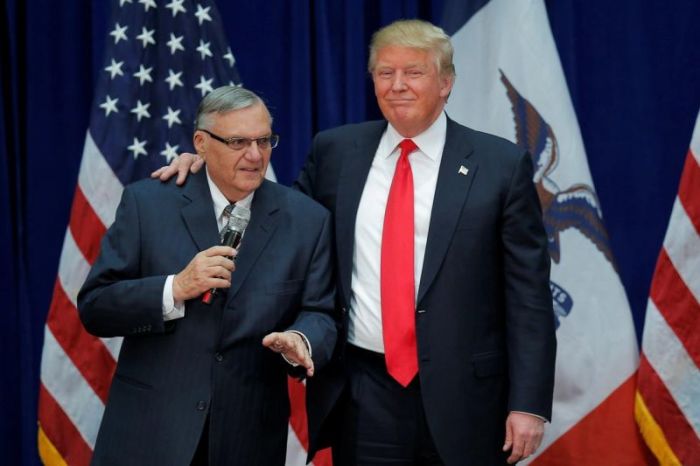Federal Judge Tells Sheriff Joe Arpaio Trump Can't Erase Facts, Refuses to Wipe Criminal Record

A federal judge refused to wipe the criminal record of former Arizona Sheriff Joe Arpaio who was pardoned by President Donald Trump in August after he was convicted of criminal contempt in a racial profiling case.
Telling him the president cannot erase facts, Judge Susan Bolton said Trump's pardon only spared him from the possibility of going to jail for up to six months, according to Capitol Media Services.
"The power to pardon is an executive prerogative of mercy, not of judicial record-keeping," Bolton wrote, citing earlier court precedent.
"The pardon undoubtedly spared defendant from any punishment that might otherwise have been imposed," the judge noted. "It did not, however, revise the historical facts of this case."
Arpaio, however, has refused to back down and plans to appeal the decision.
"It's not going to be dropped," he told Capitol Media Services.
Jack Wilenchik, one of the former sheriff's attorneys, said if the record of the conviction remains, it could be used against the 85 year old in future criminal or civil cases.
"We're not asking to undo facts," he said. "We're not asking for expungement. There's no such thing in federal law."
Wilenchik wants the court to treat the conviction as legally moot. As for example in the case of an individual who dies before sentencing.
"The whole case gets undone," with the conviction nullified he said.
Bolton argued, however, that what Arpaio wants is to ignore the legal nature of a pardon.
"It does not erase a judgment of conviction, or its underlying legal and factual findings," Bolton said. She noted that there is case law showing that a pardon carries an imputation of guilt and accepting a pardon is "a confession of it."
In 2008, a judge appointed by President George W. Bush found that Arpaio's jails were unconstitutionally abusive. He reportedly did things such as publicly parading undocumented inmates into a segregated area of his "Tent City" jail. Another judge also ordered Arpaio to cease-and-desist his department's racial profiling practices. Arpaio was recommended for criminal prosecution when he refused to obey. The defiant sheriff, said he would "never give in to control by the federal government."
When Trump decided to pardon Arpaio, Republican speaker of the House Paul Ryan and other members of the GOP spoke out against it.
"Law-enforcement officials have a special responsibility to respect the rights of everyone in the United States. We should not allow anyone to believe that responsibility is diminished by this pardon," Ryan said in a statement.
"The speaker does not agree with the decision," Ryan's spokesman Doug Andres added.
Arpaio, however, dismissed the case as a "political witch hunt."
"Thank you @realdonaldtrump for seeing my conviction for what it is: a political witch hunt by holdovers in the Obama justice department!" he tweeted the day he was pardoned.
Arpaio, who was once known as the self-styled "toughest sheriff" in America, once place placed 38 inmates on a bread and water diet in six of Arizona's jails under his control because they desecrated the United States flag.
"These inmates have destroyed the American flag that was placed in their cells. Tearing them, writing on them, stepping on them, throwing them in the toilet, trash or wherever they feel. It's a disgrace to those who have fought for our county," said Arpaio in a press release. "Besides, this is government property that they are destroying, and we will take action against those who act this way."





























